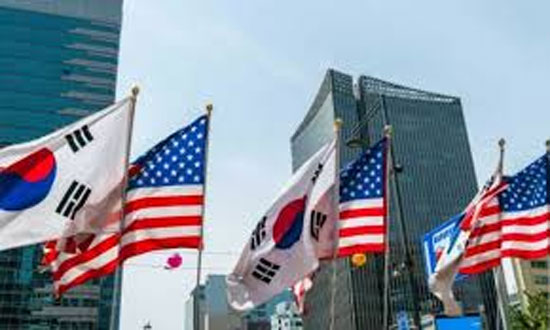Daijiworld Media Network - Washington
Washington, Aug 2: U.S. President Donald Trump confirmed a breakthrough in trade relations with South Korea this week, declaring the bilateral relationship as "great" following the conclusion of a new trade agreement that lowers tariffs and secures major investment commitments from Seoul.
Speaking to reporters during a press interaction, Trump revealed that South Korean President Lee Jae Myung is expected to visit the White House within the next two weeks, where the two leaders will discuss the agreement and other bilateral issues.
"We have a great relationship with South Korea," Trump said briefly in response to questions about the upcoming summit, according to Yonhap News Agency.

Under the revised agreement, the United States has agreed to reduce its proposed 25% reciprocal tariffs on Korean goods to 15%, in exchange for substantial investment and trade commitments by South Korea. These include a $350 billion pledge to invest in the U.S. economy and $100 billion worth of purchases in American liquefied natural gas (LNG) and other energy products over the next four years.
Trump touted the deal as a significant win for American energy and manufacturing sectors.
A point of contention, however, emerged over agriculture—particularly rice. The South Korean government clarified on Thursday that the trade deal does not include any provisions to further open its rice market to U.S. products. This clarification came after White House spokesperson Karoline Leavitt stated that the agreement improves market access for American agricultural goods, including rice—echoing Trump’s earlier comments.
In a joint press release, Korea’s finance, industry, and agriculture ministries reaffirmed: "The Korea-U.S. trade deal did not cover the rice issue."
This response reflects longstanding concerns in South Korea over protecting its sensitive agricultural sector from foreign competition.
In addition to rice, Washington has also pushed Seoul to relax restrictions on U.S. beef, particularly regarding Korea’s ban on beef from cattle older than 30 months—a regulation stemming from past concerns over mad cow disease. While no final agreement has been reached on this issue, it remains a priority for the U.S. agricultural lobby.
South Korean Foreign Minister Cho Hyun confirmed that discussions are underway to finalize the date for the upcoming summit between Presidents Trump and Lee. The visit is expected to focus not only on trade but also regional security, investment collaboration, and energy cooperation.
As the U.S. pursues aggressive trade realignments globally, the South Korea deal highlights Washington's efforts to secure both economic concessions and geopolitical stability in East Asia—though some issues, like agriculture, may continue to spark friction.